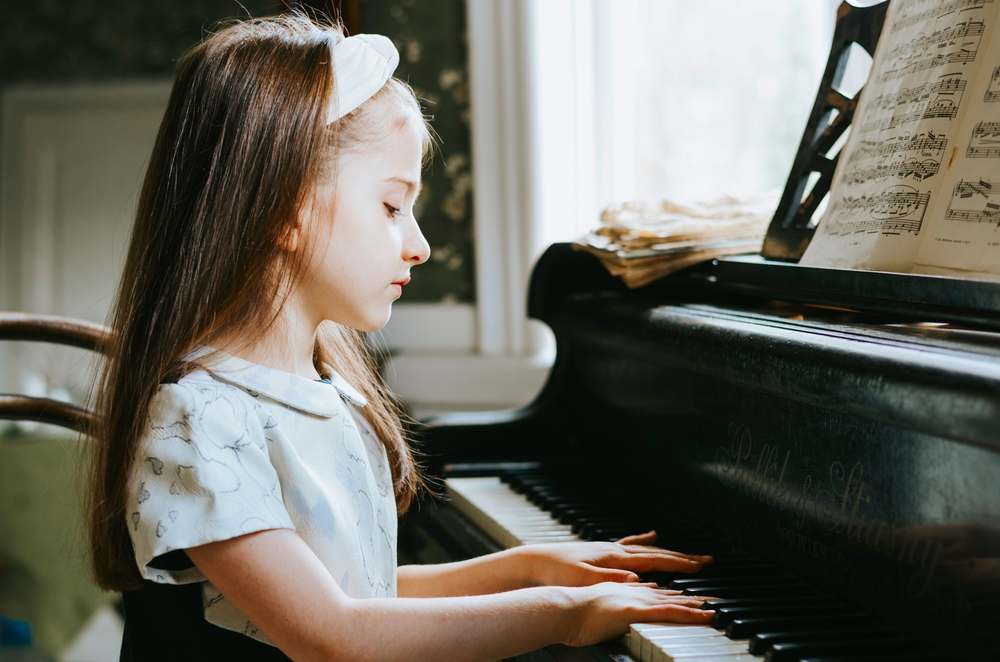 Deciding when to start piano lessons is a common question for many parents. While children can start piano lessons at various ages, beginning at ages 4 and 5 is a great start. At this formative stage, children are like sponges, eager to absorb new information and skills.
Deciding when to start piano lessons is a common question for many parents. While children can start piano lessons at various ages, beginning at ages 4 and 5 is a great start. At this formative stage, children are like sponges, eager to absorb new information and skills.
This article explores how piano lessons for young beginners are structured and the unique teaching methods used to ensure their success. Whether you’re curious about how these lessons progress or what your child will learn, here’s a glimpse at the journey of young piano students.
How to Teach Piano to a 4 & 5-Year-Old?
As a piano teacher, I love working with young beginners! The lessons are different in flow and are based much more on constant interaction than older beginners—this speaks to the need of younger beginners to have ultimate guidance through each new technique and their note reading development. With curriculums developed for the pre-reading age group, piano lessons can be very successful for 4 and 5-year-olds, and I find it rewarding as an instructor to see the major advancements in fine motor skills and overall reading ability that happen around this age. So, what can you expect in piano lessons for your 4 or 5-year-old?
Engaging Through Interactive Learning
Overall, children around the ages of 3 to 6 are sponges for new knowledge. They are in an absorption phase of mental development, and these are the ages where language and reading abilities are advanced the most. In piano lessons, younger beginners incorporate musical concepts very fluidly into coordination and reading development, but the process happens a little differently at a pre-reading age. Interaction is the key to expressing correct technique and note-reading ability to a young beginner. In the first lessons, teachers will incorporate a lot of back-and-forth imitation for simple concepts, like demonstrating loud versus soft sounds, and high versus low sounds.
Exercises will utilize black key identification to pick up on repeated patterns on the keyboard and progressively bring in new notation concepts where the student can identify patterns that move up and down and change fingers accordingly. All of these concepts establish musical bearings for a young beginner on the piano, as well as the development of coordination on the instrument, but they are accomplished through imitation and guidance first before shifting to an independent experience.
The Power of Repetition in Learning
Reinforcement of new concepts in piano lessons comes from lots of repetition. Once a teacher works with a student on an exercise or their first songs, parents should expect that they will be repeated for a few weeks, even if they are mastered by the student. This repetition and variance between new and old concepts ensures that the dots are connected between early ideas and new ones.
Making Learning Fun
The ultimate goal of these lessons is not just to teach piano but to instill a love for music. Teachers make these sessions enjoyable by incorporating fun activities and allowing children to perform short pieces. This not only boosts their confidence but also allows them to share their progress with friends and family, making learning a joyous part of their lives.
Positive Reinforcement Strategies
The best teachers for younger beginners are ones that positively reinforce the achievements and advancement of their students. For me and many other teachers, positive reinforcement is not a form of appeasement for young students—it is amazing as an educator to have a young student gain musical understanding, and I find myself stunned sometimes at the ability of 4 or 5-year-olds to process complex ideas for their age. This starts with having the students feel good about every new thing they learn in piano lessons, encouraging the desire to keep progressing.
Are Piano Lessons for 4 and 5-Year-Olds Worth It?
Many parents ponder if piano lessons at such a young age are truly beneficial. Can a 4-year-old learn piano? Is it worth teaching piano to a 5-year-old? From my perspective as a teacher, the answer is a resounding yes.
Early musical training goes beyond teaching children how to play an instrument—it helps develop critical thinking skills, enhances coordination, and can even boost early literacy skills. The benefits of starting piano lessons at ages 4 and 5 extend into other areas of a child’s life, making it a worthwhile investment in their overall development.
Start Your Child’s Musical Journey with Lessons in Your Home!
Piano lessons for young beginners can be very successful, and if you are unsure what to expect, rest assured that a young beginner’s curriculum will be age-appropriate and modeled to their learning style. Ages 4 and 5 are a great time to start piano lessons, providing an educational extra-curricular activity that can lead to a lifelong appreciation of music.
Looking for 4 and 5-year-old piano lessons near me? Start your piano lessons with Lessons in Your Home today or contact us to discover how we make piano learning a joyful and rewarding experience for your child!

Hello do you offerVirtual piano lessons for 5 year old
We sure do and it’s easy to start. We teach 7 days a week 9am to 9pm. We just need to know when you can take lessons and we can work on scheduling. I left you a voice message and sent an email so I look to hear back from you soon:).